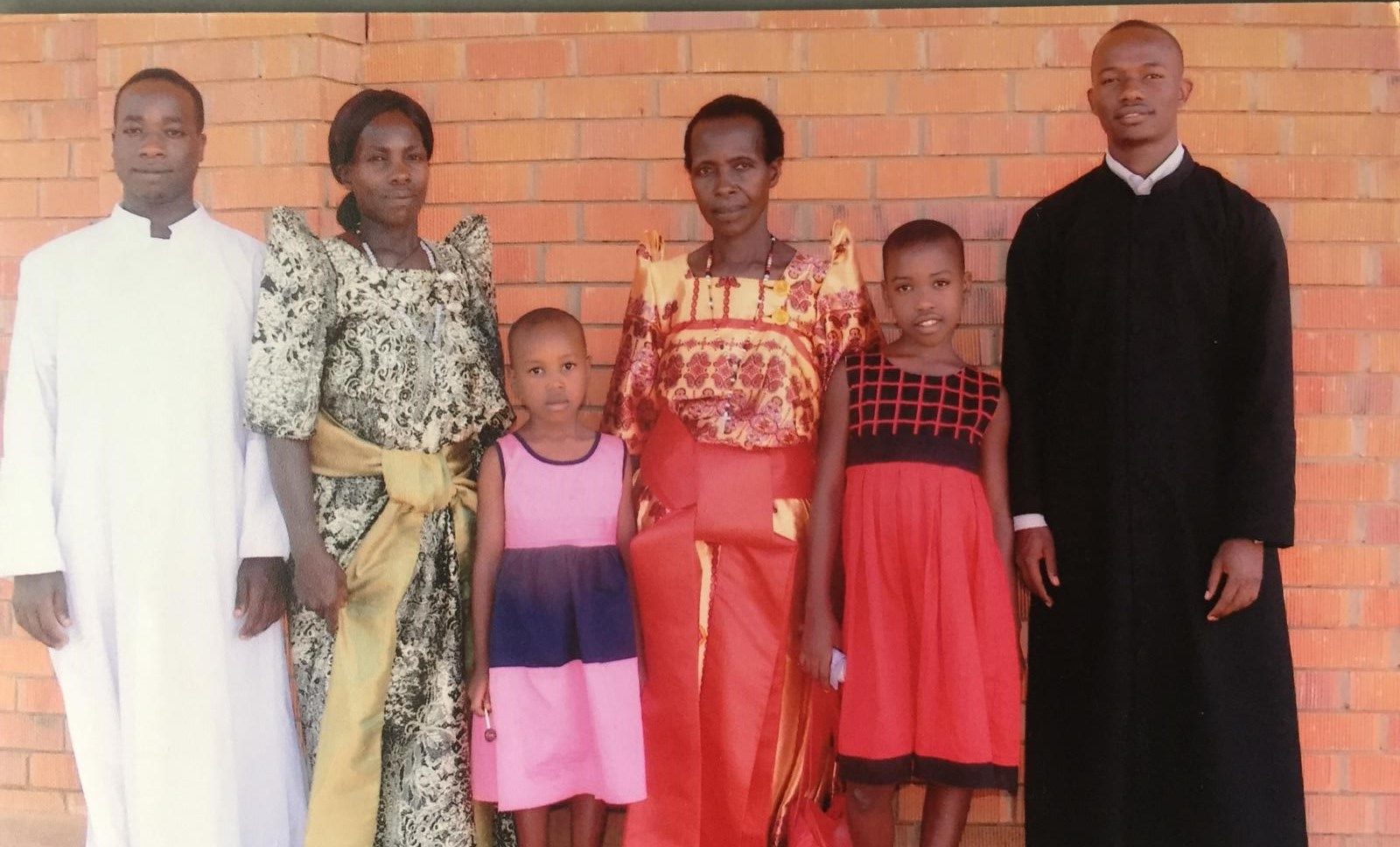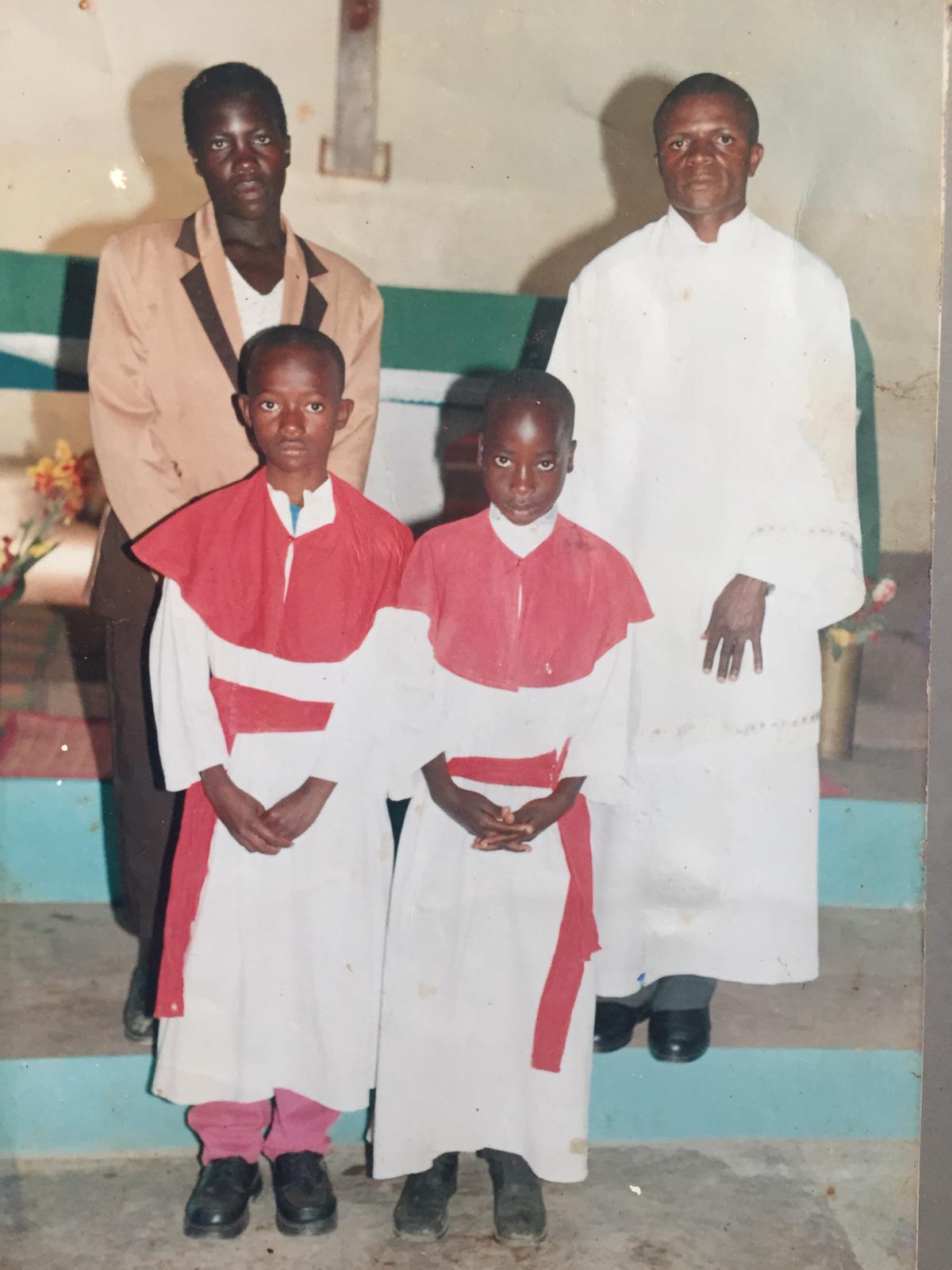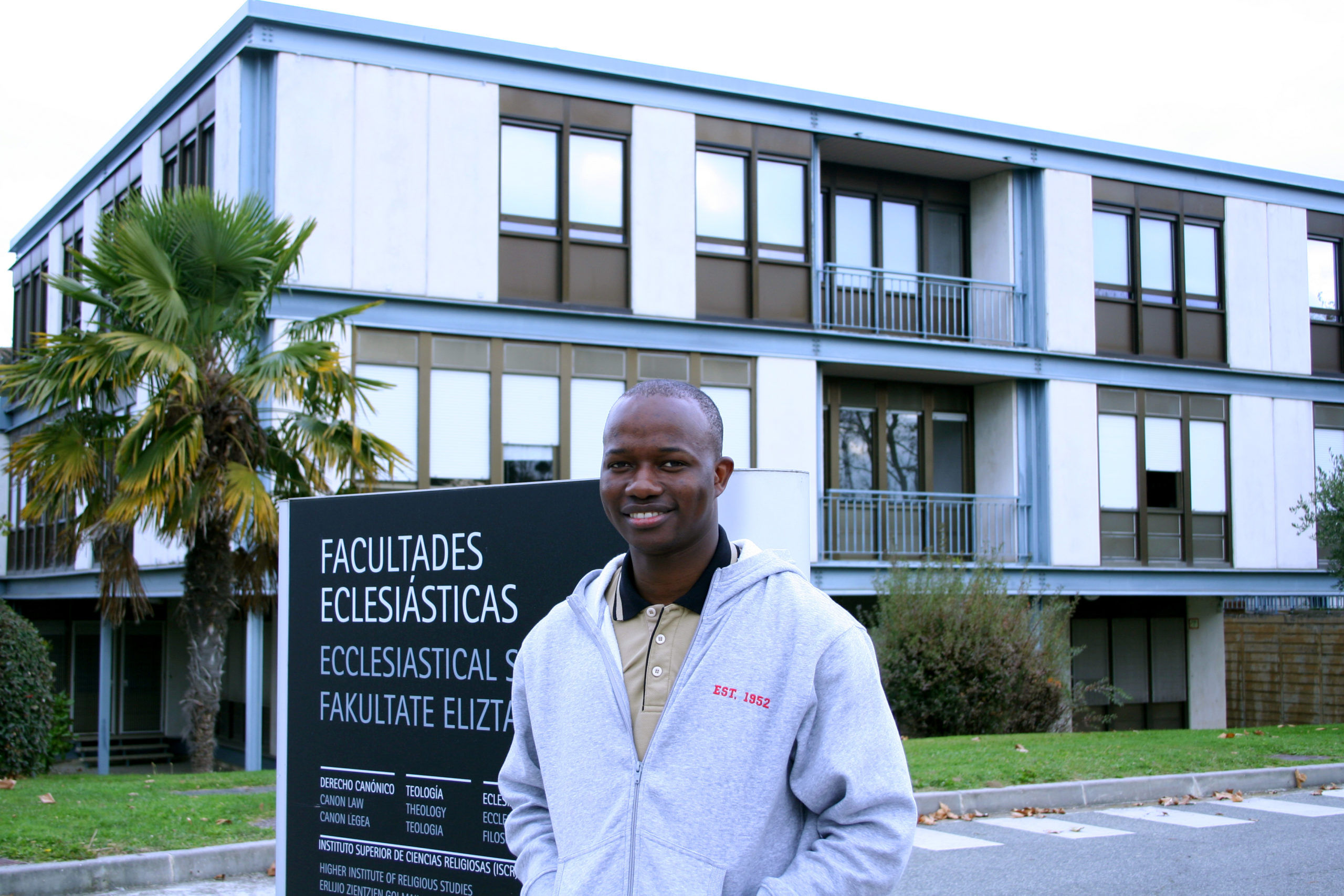
Timothy Katendea 28-year-old Ugandan seminarian, is a 5th year student of the Bachelor of Theology at the University of Navarra and is being educated with a scholarship from the CARF Foundation. He was orphaned as a child and was raised by his uncles and aunts. He is the first member of his diocese. Kiyinda-Mityana, who is coming to Spain to study theology.
As he unravels his present and future, Timothy visualizes the road he has traveled. Barely a month after his birth, he lost his mother and at the age of seven his father, which meant that he had to be separated from his brother to be raised by relatives in Maddu, a village in the diocese of Kiyinda-Mityana.
"Growing up with my uncles and my four cousins who were around the same age as me helped me a lot. Also, in the village there was a good family atmosphere and I had many friends with whom I played soccer and went to elementary school. My aunt and uncle supported me a lot with the little they had, they gave me a lot of affection and sacrifice. I never lost contact with my brother," he says.
To Timothy, the role of the family is very important because that is where moral and social values are taught: respect for others, responsibility and care for cultural and religious practices. "The family is where one should feel most loved, respected and supported. In families, one teaches and learns one's responsibilities and obligations," he explains.
Since he was a young boy, he collaborated in the parish as an altar boy, organizing the choir and transmitting the priest's announcements to the community.
"After the national exam to finish primary school, when I was 13, the parish priest told me about the minor seminary that was looking for young boys and asked me if I would like to go: I was thrilled!" he says.
Overcoming the access was one step, but paying for the studies and the material was even more difficult. The parish priest explained the situation at the Sunday celebration and the neighbors came out to help him.
It was the beginning of a journey that he continued after passing six courses and entering the major seminary (Alokolum Major Seminary) in Gulu.
"The family is where one should feel most loved, respected and supported. In families, responsibilities are taught and learned."

As he unravels his present and future, Timothy visualizes the road he has traveled. Barely a month after his birth, he lost his mother and at the age of seven his father, which meant that he had to be separated from his brother to be raised by relatives in Maddu, a village in the diocese of Kiyinda-Mityana (Uganda).
"Growing up with my uncles and my four cousins who were around the same age as me helped me a lot. Also, in the village there was a good family atmosphere and I had many friends with whom I played soccer and went to elementary school. My aunt and uncle supported me a lot with the little they had, they gave me a lot of affection and sacrifice. I never lost contact with my brother," he says.
"When I finished I was offered a scholarship to study French philology: I liked law and languages.... but it was already clear to me that I wanted to be a priest, I wanted to follow the path that God had chosen for me. And so he continued his formation with three years of philosophy, another of pastoral work in a parish and another of theology at the Kinyamasika Seminary. He was there when he was called to come to Pamplona.
"When I was told that my bishop, Msgr. Joseph Antony Zziwa of Kiyinda-Mityana diocese wanted to talk to me, I was a little worried. But then the fears dissipated. He asked me if I wanted to come to Pamplona to study. I told him that if there was the opportunity, I was willing. I did it freely and obediently".
This is how Timothy Katende began his Spanish adventure, becoming the first member of his diocese to come to Spain to train in theology, as they usually travel to Italy or the United States.
The initial fears of entering an unfamiliar culture and a strange language, as well as "the concern for the bishop's trust and the responsibility to do well," were overcome by enthusiasm.
"Many of us find ourselves in the same situation, so we learn and help each other. This situation has made me mature," explains Timothy, who hopes to draw on his experience in the future. "It is clear to me that wherever I go I want to seek vocations by telling my testimony. and explaining that the responsibility has to be of the whole parish: there are many families willing to help others and the Church needs vocations".
Since she arrived in July 2017 to learn Spanish, she has been living at the Bidasoa International Seminary and this year she is studying the 5th year and finishing Cycle I with the Degree in Theology at the University of Navarra thanks to the CARF Foundation.
He hopes that putting what he has learned at the service of his diocese will be, he says, a way of showing gratitude both to the formators he has had and to the benefactors who allowed him to be formed in Uganda initially and now in Pamplona: "I am very grateful to all those who support me on this path".
"Putting what I have learned at the service of my diocese is a way of thanking both the formators I have had and the benefactors who allowed me to be formed in Uganda initially, as now in Pamplona."

His diocese, Kiyinda-Mityana is located in the central region of Uganda, in the ecclesiastical province of Kampala. "It is a rural diocese. Many children don't have the opportunity to go to school and sometimes those who manage to finish elementary school don't get far in their studies because of financial problems," he says. That is why he is clear that when he returns he wants to look for "vocations by telling my testimony and explaining that the responsibility has to be of the whole parish: there are many families willing to help others and the Church needs vocations".
His diocese, Kiyinda-Mityana, is located in the central region of Uganda and in the ecclesiastical province of Kampala. "It is a rural diocese. Many children don't have the opportunity to go to school and sometimes those who manage to finish elementary school don't get far in their studies because of financial problems," he says.
Timothy explains that most schools lack necessary resourcesFor example, access to water, chairs or blackboards in the classrooms, electricity, etc. There are even some schools without roofs.
In his diocese, 40% of the population is Catholic, although the majority is Protestant Christian. But it is mostly Christian. However, Islam is growing more and more. Although now the population of Muslims is growing more and more.
Current uncertainty also surrounds his future ordination, but Timothy knows what he would like to do when he finishes his studies: "My dream is to return to a parish in my country and, apart from the work of a priest, I would like to support vocations. I have been able to study thanks to benefactors and I have seen many who have not been able to continue their studies due to lack of resources.